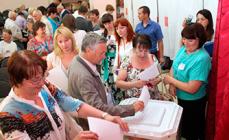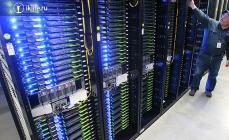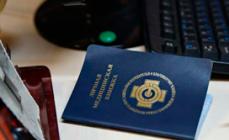In the first hours of voting, only 50 thousand people came to the plots (less than 1%). According to the co-chair of the movement "Voice" Grigoria Melkonanz, in total in the capital according to the data on January 1, 7.3 million voters were registered.
The lack of excitement in the sites noted the RBC correspondent, which visited the Odintsovo district of the Moscow region. Plots in Barvikhe were Practically empty. Little visitors with difficulty answered the question of what kind of primaries. "Specifically, I will not tell you," said the middle-aged woman, published from the site at school number 5. She learned about the vote from the leadership of a kindergarten, which works, "the staff said" Be sure to come to vote. " As of 17:00, the turnout in this municipal district amounted to 7.1%, RBC was told in the local batch department.
By 16 o'clock, according to the site of the party, the total of 6.2 million citizens took part in the primaries.
During ordinary electionsMoscow and the Moscow region regularly turn out to be among the regions with the lowest appearance - there are a little more than half of the voters. The highest rates are traditionally at the Chechen Republic, the turnout here reaches 100%.
In general, on the usual elections, the turnout is several times higher. So, by the middle of the day, Sunday in the Nizhny Novgorod region voted to the primaries of 5% of voters, and at the regional elections in 2014, by this time, the appearance of 30%. In the Khabarovsk Territory, electoral participants were closed on Sunday with a preliminary appearance of 6%, 53% of voters voted during the elections to the State Duma in 2011.
Residents of Grozny at the polling station during a preliminary vote for candidates from the United Russia party, nominated for elections to the State Duma of the Russian Federation (Photo: Said Tsarnaev / RIA Novosti)
Violations on primary
The largest number of complaints and messages (50) about violations were enrolled in Primorye, where two dozen people broke into the polling station in the village of Plastun. For vote and all rooms together with people, demanding falsify the results in favor of one of the candidates. The room together with people and the urn evacuated the police.
In "United Russia" confirmed the fact of bribing the voters before the primaries in favor of the Igor Ibyshev candidate in the suburban city of Odintsovo. According to the RBC source in the leadership of the local branch of the party, the question of bribing the voters was made to discuss the organizing committee for the conduct of primary. Iischev "The remark was made so that such a type of agitation was applied."
And in the Lyubertsy district, RBC correspondent became an eyewitness of organized mass "carousels": manipulations with a multiple visit to the polling stations with one group of people. For several cars and buses, students and state employees tripled three times on the same sites to give the votes to the necessary candidates. Showing a conditional sign (sticker) in a passport, RBC correspondent, although registered in another region.
Previously, strangers on the street are offered for 200 rubles. Vote for this candidate, RBC told several participants and organizers of the preliminary vote. ISESHER himself, having heard the question of the RBC correspondent about bribing the voters, put the phone.
Several people police detained at the polling station in St. Petersburg, reports TASS. According to the agency, they broke into the premises of the site in the Krasnoselsky district and tried to put pressure on the commission.
On Sakhalin, Anna Petrov's observer stated that she was beaten after she tried to fix the compulsory vote at the Fisherman's factory. According to the agencySakhalin.info. The woman tried to photograph how the factory was brought to a balloon for voting when the procedureprimerizes Does not imply an offering vote.
In the Perm Territory on illegal campaigning: holding lotteries in support of some candidates.
The co-chairman of the "Voice" Movement Grigory Melkonyanz told RBC that, since primaries are party events, then their organization on Sunday monitors only violations related to the use of administrative resources - for example, cases of compulsory voting or illegal agitation by officials. According to a card of violations as of 16 hours, 56 complaints were recorded on it, 35 of which came from Moscow.
February 15 in United Russia started nomination to participate in preliminary voting (primaries) on the selection of candidates for elections to the State Duma. The primaries themselves passed throughout the country on May 22.
What is primaries?
- Primeraz (from English. Primaries is primary) - preliminary intrapartare selection of candidates for their further participation in the "main" elections. A similar procedure is common in the United States (in detail how primaries in the United States are arranged in a special TASS project). Experts note that a preliminary vote in the Russian Federation and the primaries in the United States are different mechanisms.
Why do you need primaries?
- This practice is designed to improve the "high-quality" composition of candidates, as well as find potentially promising promoters, to claim that, especially in the struggle for single-member districts, may other parties.
- A preliminary vote gives the party the opportunity to significantly update the personnel composition of the deputy corps - including at the expense of people of non-partisans, who also have the opportunity to nominate their candidacy.
- In "United Russia", it is believed that the preliminary vote is not only democratic, but also more efficiently for other selection mechanisms (when candidates, for example, are determined by shedding, in the cabinets of party functionaries).
Who was the first to apply a prior voting procedure in the Russian Federation?
- The First Russian Party, who applied such a procedure, became "United Russia". Since 2009, a preliminary vote is mandatory for the party, this rule is enshrined in its statute.
- This year, the nomination on the primaries of United Russia started on February 15 and ended on April 10, and on April 15, registration was closed.
How were the primariza "United Russia"?
- According to the Regulations on the preliminary vote, approved in early February at the congress of the party, to take part in the primaries could either members of the United Russia, or non-partisan, who have no criminal record (even removed or repaid), who do not have accounts and other financial instruments abroad.
- Primerizes were secret and rating. This means that each voter can vote for one candidate, but for several in each list. The party's leadership is calculated that this will allow you to identify the leaders of public opinion.
- A federal organizing committee was created for the preliminary vote, as well as 85 regional, which included the heads of the regional executive committees of United Russia. About a third of their members are representatives of public associations, the media, the leaders of public opinion.
What are the results of the primary "United Russia"?
- 2781 candidates took part in primary: 1171 people put forward on party lists, 2107 people were put on one-member districts. Almost half of all candidates were non-partisan.
- 960 preliminary voting participants work in the field of entrepreneurship, 199 - in the health sector, 182 - in the field of education, 829 participants - deputies of all levels, from municipalities to the State Duma. A complete list of preliminary voting participants can be found on the site "United Russia".
- The turnout on the preliminary voting exceeded 10.5 million people - 9.6% of all voters of Russia, said the secretary of the General Council of United Russia Sergey Neversov. In the 74th of 225 single-member districts defeated the existing State Duma deputies, in the 151th district of the victory won "completely new faces in the districts".
- The list of single-mandate candidates and regional lists from the most popular candidates who, with the support of the party, will go to the polls of the State Duma deputies will prepare for the "United Russia" scheduled for June.
What about the system of primaries in the Russian Federation speaks Russian President?
- Vladimir Putin expressed the opinion that the primaries would allow to identify the real problems of citizens and those who are able to solve them. Speaking at the MediaForum of the All-Russian Popular Front in St. Petersburg, the head of state stated that the preliminary vote makes the life of the party "more transparent, close to people." "Party functionaries should feel that in society occurs in the course of such open discussions, the disputes are revealed by real problems that are facing people," the president emphasized.
What kind of primaries think Russian politicians?
- The provision of new people will bring to work "United Russia" of new people, the Chairman of the Party, Prime Minister Dmitry Medvedev, believes. "Of course, this is (primarizes) such an interesting international institute, but for the first time we apply it, and" United Russia "went on it consciously in order for as many new citizens of our country as possible in the party," Medvedev said.
- Speaker of the State Duma Sergey Naryshkin considers primaries the form of support for people who decided to do politics. He also added that he did not like the word "primaries", preferring to him the term "preliminary party vote."
- The preliminary vote is important for building a dialogue with voters before the election campaign, to understand the candidates of issues that exciting people. This opinion was expressed by the first deputy head of the Presidential Administration of the Russian Federation Vyacheslav Volodin. "Competitive, an open preliminary voting model allows you to cover most voters who are actively interested in politics and are going to come in autumn to elections. If the primaries are effective, then they are the real promotion of candidates before the elections," the first deputy head of the Presidential Administration of the Russian Federation stressed. According to Volodin, "the preliminary vote is very important for building a dialogue with people at the stage before the election campaign, to understand candidates from the agenda, issues that worry people, building a personnel line."
Are there those who oppose the primaries?
- "Primerizes are carried out from gluttony to relieve their appetite. We have a primarization - this is the work of the party every day we spend," said LDPR leader Vladimir Zhirinovsky. According to Zhirinovsky, United Russia holds a preliminary vote due to excess people in the party. "They do not know people how they are from 2 million people to pull 225 candidates (according to single-member districts) ... And we have a party of 250 thousand people, we easily find 225, we know them," the politician stressed.
- The leader of the Communist Party of the Communist Party of the Russian Federation Gennady Zyuganov said that "primaries do not decide anything to the end - money and big capital decide there." The CPRF candidate selection system was called the most democratic in Russia: "We (Communists) from below offer each candidate."
What about the System Primerizes in the Russian Federation experts think?
- "The preliminary vote of" United Russia "gives a serious impetus to the entire electoral process, and it is possible that the principles of openness, competitiveness and legitimacy will also be distributed to other parties," said the head of the general political science of the Higher School of Economics Leonid Polyakov. United Russia replaced the format of preparation for the Duma elections, going to the public and open formation of lists and candidates for single-member districts, and thus the principle of competition "fully withstands", the political scientist is sure.
- "The peculiarity of this mechanism (primariza), except that it works in the interests of United Russia, and it is completely clear, voters also benefit from using this mechanism." -. He explained that in this case the voter gets the opportunity to get acquainted with applicants "in advance, and he comes out more competent and more prepared." According to the political scientist, primarizes, only a very strong party can afford, confident that the primarization mechanism will encourage regional organizations through the inevitable conflicts, collisions for regrouping, reconfiguration so that voter support for the party is the main political resource.
Someone else conducted primarizes before elections to the State Duma?
- Primerizes also conducted the so-called democratic coalition, created on the basis of the Parnas Party. However, by mid-April, it turned out that the interest in Parnass Primerizes was low not only among candidates who had to make 20 thousand rubles of the registration fee, but also among voters.
On January 21-22, 16 Congress of the Political Party "United Russia" was held in Moscow, in which the Chairman of the Party of Dmitry Medvedev emphasized the need to continue the practice of the United Nations Preliminary Party Voting Day (primaries) in the elections of all levels.
On September 10, 2017, the election of the region's governor will be held in our field. We talked about the models of internal political vote and the upcoming governor elections with a political consultant, a candidate of political sciences, director of ANO "Center for Social and Political Initiatives" Alexander Semenov.
- Alexander Viktorovich, what kind of beast is this - primariza, and what are open and closed primaries models?
In fact, primarizes is a preliminary intrapartare vote to determine a candidate for a particular election position, for example, the governor. I emphasize is an internal event, that is, the party wants to first understand and decide to determine who is most worthy of potential candidates. As for models of an internal prior vote, today there are four of them.
According to the first - the most open, vote have the right residents of the region who came to the plots. On the second model, all residents of the subject can also vote, but they must first register. The third model provides that only members of the authorities and members of public organizations are becoming the electors. Finally, in the fourth model, the right to vote is only among the members of the party.
 In the practice of United Russia, it was so that under regional elections it was the regional office that determines which model will be a preliminary vote. For example, in the elections of deputies of the State Duma last year, "United Russia" used the first model: any voter could vote. But here is the governoric primaries in 2016 in all regions where the elections of chapters took place on the third model: candidates were selected by party members and social activists. So once again I emphasize: this is a completely intra-page solution - what model, in which elections, and in which regions it is used.
In the practice of United Russia, it was so that under regional elections it was the regional office that determines which model will be a preliminary vote. For example, in the elections of deputies of the State Duma last year, "United Russia" used the first model: any voter could vote. But here is the governoric primaries in 2016 in all regions where the elections of chapters took place on the third model: candidates were selected by party members and social activists. So once again I emphasize: this is a completely intra-page solution - what model, in which elections, and in which regions it is used.
Criteria for expediency
- A, maybe then do not need this preliminary vote, since this is an internal party event?
Once this was repeated and repeated again: the party that actively uses the primary procedure, even before the official election campaign, it creates competitive advantages.
First, it is an early start long before the start of the official campaign. And here as in the proverb: often the one who simply ran out, and does not run faster.
Secondly, it is an opportunity to appreciate who from potential candidates is the most powerful in electoral plan. After all, even the fourth, most closed model, when only members of the party vote, allows you to understand: who in the party is the most authority, who can competently build a campaign at the level of preliminary voting. Party members are the same voters ...
- It turns out that only the advantages for the party are among the prior vote. And what other batch, except for United Russia use a preliminary voting procedure?
There were attempts to organize primaries from "Fair Russia" and "Parnassa", but it is impossible to call them successful. To date, only "United Russia" organizes and conducts primaries on a systematic basis.
- And why others do not use such opportunities if there are only advantages from the preliminary vote for the party?
In fact, this question must be asked to representatives of parties. I can only nominate assumptions about why not use. In my opinion, other parties in both parliamentary and non-parliamentary, this is, first of all, is associated with the usual personnel deficit, in fact, choose that not from anyone, therefore do not use. While "United Russia" is a long personnel bench.
The voter needs real results ...
- Let's return to the governor's primaries in our area. What do you think the model will pass a preliminary vote in our area?
I am not a member of United Russia and its governing bodies. We will emphasize once again, it is an absolutely intrapartler business - what model to use. And to solve it by the federal and regional governing bodies of United Russia, and this is normal. You know, I would even suggest a situation when only one person will be put forward on the primarizer of United Russia in the region - the rest simply won't want to compete with it. And this is also a normal situation.
As for the fact that, according to the results, the primaries, we most likely, and we will know who will become the governor of the region, so this is, in my opinion, the problem is not "United Russia", but other parties. I have already spoken and repeating again: the regional offices of the parliamentary opposition are in a deep crisis, not to mention the regional offices of non-Parliamentary parties. Here you need to do not talk about the chances of winning, but rather that representatives of the parliamentary and non-parliamentary opposition in the region can pass the municipal filter and register their candidates.
- What do you mean, Alexander Viktorovich?
It is necessary to understand, in order to become a candidate for the governors of first, it is necessary to overcome the so-called municipal filter, that is, to enlist the support of a certain number of elected deputies and heads of the local level. In accordance with the regional law, it is 7% of the total number of elected municipal deputies and chapters in 22 of 29 municipalities of the Ryazan region. In previous elections in 2012, this was 230 signatures, while 44 of them were to be a signature of deputies of the district DUM and the Duma of urban districts. Today, due to a change in the total number of elected municipal deputies and heads in the area, the potential candidates for the governors will need to collect 219 signatures in 22 of the 29 municipalities of the Ryazan region, while 48 of them must be signatures of deputies of the district DUM and Duma city districts.
 That is, the parties, in fact, will first have to seriously work with municipal deputies and chapters before you register your candidate for governors. And here it is necessary to pay attention to the local elections in the area, which were held in September 2016 together with the elections to the State Duma.
That is, the parties, in fact, will first have to seriously work with municipal deputies and chapters before you register your candidate for governors. And here it is necessary to pay attention to the local elections in the area, which were held in September 2016 together with the elections to the State Duma.
- Yes, there was no information about their results on their results ...
This is understandable, everyone wrote and spoke about the results of elections to the State Duma. In the meantime, 225 mandates of local chapters and deputies were substituted in September. "United Russia" nominated 225 candidates and took 206 mandates. The Communist Party put forward 73 candidates and took only 13 mandates. LDPR put forward 59 candidates and took only 4 mandate. "Fair Russia" nominated 26 candidates and did not take a single mandate! Other parties in general, these elections ignored. Well, another 2 mandate took self-imaging.
- What does it say about?
This suggests that there will be no problems with the passage of the municipal filter only at the candidate from the United Russia. Candidates from other parliamentary parties will simply miss their deputies and chapters to pass the filter. About the non-Parlamentary Party of Speech does not go at all!
- And how will it happen in practice?
Most likely, two options are possible. The first (the least realistic) - we will see attempts to bribe local chapters and deputies. This option is unrealistic due to the fact that it will require substantial resources, and I, for example, I can not imagine local deputies and chapters that would put all its future on the sake of some very dubious prospects!
The second possible option is the nomination of technical candidates and their support from local deputies of the same United Russia. Then it turns out that all of them are spoilers whose task is to blur the protest and displeased electorate.
Naturally, the non-Parlaneous opposition will declare that he puts forward his candidates - but it will be a circus, no more. In fact, they will strive to simply find the situation, to start an active pre-commerce in the regions where regional elections will be, to the presidential election. This is their goal, in fact, the presidential election. Their task: to constantly prove that all the election processes are not illegitimate! But there are electoral legislation, the municipal filter in the elections of the heads of the regions began to be used since 2012. What prevented them for five years to work at the local level, actively participate in the elections of local chapters and deputies?! Nothing!
- Is not alternatively enough?
Yes, but in this situation the opposition besides himself to blame some. Who prevented them to engage in local elections and hold their candidates?! Today I need a painstaking systematic work with voters in the interconnection period, at the level of primary cells of parties, only in this case it is possible to obtain some significant result in the elections, it will not be possible to otherwise. But some were probably just stuck somewhere in the late 90s, and believe that in a couple of months the official election campaign one can achieve a significant result. These are illusions, those times have passed and will not return. The voter wants to be remembered not only in the elective period, the voter wants to see real results for himself.
And, as a result, the main intrigue, indeed, is the one who will become a candidate for governors from United Russia. And a referendum type of campaign: a candidate from United Russia will have to compete with objective difficulties: a decrease in the level of income of the population, rising prices, etc. All supposedly opposition candidates will play the role of the statists - no more ... and here, in a natural way, the question of the voter's interest in these elections will arise, the issue of the appearance and legitimacy of elections. But this is a topic for a large, separate conversation ...
- Thank you, Alexander Viktorovich, for a detailed interview!
Reception of documents for participation in the preliminary voting of United Russia. According to the results of this procedure, future candidates for the election in the State Duma and the Altai Cason will be determined. He tells readers what primaries are.
Preliminary vote (official name), or primariza (emphasis on the first syllable) - the type of voting in which a particular candidate is chosen from the political party, which will then go to the election from the party. The concept came to Russia from the USA, where this mechanism is used since 1842. In other words, the party determines the internal voting of the strongest candidates. "United Russia" is the first and only party that holds primaries in Russia. The procedure was carried out earlier, but it was closed, internal party. In 2016, everywhere throughout the country "EP" holds open primaries, that is, candidates who will go to the elections determines the population, and not just party members.
Why are the primaries officially and in fact?
Officially, United Russia holds a preliminary vote to make a party and the process more open and understandable, to update the composition of the candidate corps at the expense of supporters of the party and understand which policies are most popular in the population. But, as political scientists explain, primarizes are still the beginning of the election campaign "EP". This, firstly, a significant occasion in the political life of the country, which will actively cover all the media. That is free PR. Secondly, the elections will be held in the fall, the main election campaign of all parties is at the lowest reactive season - summer. Vacation, cottage and so on. And the bright campaign in the spring is the most thing in memory of the population by key names.
Who can take part in the primaries?
Any citizen of the Russian Federation, who has a passive election right, which at the time of the elections (September 18, 2016) will already be 21 years old, without criminal record (even repaid), without financial assets abroad. He can be as a member of United Russia and non-partisan (even if it was also recently a member of another party, but came out of it). At the primary, any participant goes like a self-configuration, the party will not officially put forward the party. The organizing committee is assumed that any candidate who scored the most votes will be put forward from a party to the elections, no one will be forced with a distance from the distance if the population is relevant. But it should be understood that the key persons in election ballots will be required.
How and in what time frames are the primaries?
Reception of documents is conducted from February 15 (in the State Duma, the axce begins a little later) and on April 10 inclusive.
Within five days from the date of reception of documents, the Regional Organizing Committee decides on the registration of a preliminary vote participant or, if there is grounds, to refuse registration. The period for agitation among each candidate begins from the moment of registration of it as a preliminary vote. On April 2, the primaries debate for all candidates begin. The preliminary voting itself will take place on May 22. On this day, polling stations with their commissions will be opened throughout the region, real bulletins will be manufactured. To vote in the preliminary elections will be able to any citizen of the Russian Federation, who at the time of elections in the State Duma and Action (September 18, 2016) will be 18 years old and the place of residence is located within the respective constituency. Voting will be rating. After that, lists of candidates from "EP" will be formed on single-member districts and territorial groups in DG and ACST.
He spoke about the need for a long time, I will not repeat the arguments. I would like to focus on how I see technology for the initial elections.
Difficulties:
Representatives of the Crossing Forces can come to the primary elections and try to disrupt them by choosing, for example, a spoiler from power
It will be difficult to find premises for the initial elections
It will be difficult to guarantee citizens anonymity of elections, because power is unlikely to observe it
In participation in the primaries of these can put citizens at risk of repression (they can dismiss from work, deduct from university, etc.)
Perhaps the media will unevenly talk about candidates
Finance, too, an important factor that can or help hold primaries, or interfere
Yes, and the actual election organizers on the ground can conduct them dishonest
Consequently, in addition to reflections on the technology of primary elections, you will have to reflect on minimizing the difficulties described above.
Now about primaries.
1. Priority - carrying out primary elections in already existing parties and political organizations. Those. Not election among all the democrats, but conducting primary elections only within parties. For example, ATP passes through the procedure for nominating its candidates for deputies, president. Apple passes. RESD passes, etc. I am convinced if you turn off right now on global primaries - little happens. At the first stage it is important to make any local elections, federal elections, they all preceded primary in-partity. Voting inside organizations cut off Kremlin spoilers.
2. Each regional office itself determines how it conducts primaries. Wants - through the complete collection of all members. Wants - through the electors. But the best option, I think, taking into account the difficulties that are described above, provide the opportunity to take part in the voting every member of the party. It is important not to make a threshold turnout. People are afraid of repression, so do not force them. 100 people will come in the department - well. The very fact of promotion to elections is important. Well, candidates will be interested in raising the appearance of their supporters.
Perhaps in order to stop provocating from the authority, in some cases it would be useful to vote.
4. The results of the primaries should voiced immediately after conducting them in this region. It is better if it is better to carry out the primaries in stages, from the region to the region so that candidates can meet with voters, and that the opposition in principle can have elections, taking into account the power of power.
5. As a tool for conducting primary elections is useful development of resources on the Internet.
You can quickly hold elections through the electronic voting system (registration of members of the parties)
You can conduct a debate on live broadcast, to answer the questions of voters, to convey its point of view to the regions
6. Democratic forces are not yet possible to use the CEC services, so it would be helpful to seek the help of authoritative human rights organizations in order to help in conducting elections. Maybe create a separate NGO under these goals.
7. At the next stage of the demons and demons, which introduced primary elections in their structures could combine their efforts to carry out general unifying primaries, if such a need.
8. The financial part of the campaign, I think should be on the shoulders of candidates. Everyone is looking for funds and use them himself to spread its ideas. Organizational abilities - an important indicator for a potentially better leader. That Who managed to attract more funds to their campaign - that best organizer.
9. What to do voters who do not belong to the parties?
They can register in batches and political forces to participate in the elections. Party and Politseli themselves are entitled to determine who to participate in their primaries, and who does not have (in the United States, by the way, even members of other parties can take part in the internal party primaries).
I would like to pay attention to that the organization itself of this procedure radically changes the specifics of the relationship between parties and voters. Voters are able to influence accents, the program, the leadership of parties. And the parties legitimate their leaders, their programs, and potentially increase the number of their supporters.






